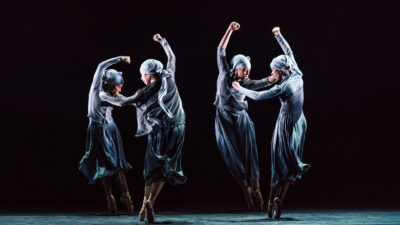
Carmen
Born free, lived free, died free
Overview
Don José’s life is all mapped out. A dutiful, well-respected soldier, he has his mother’s blessing to marry the woman he’s sure he loves. And then one day, unannounced and unexpected, Carmen walks into his life. From that moment on, he knows there’s no going back and that his life will never be the same again.
Carmen, the opera, and Carmen, the woman, are both full of seductive paradoxes, but Bizet’s music conspires to carry us on a journey which allows the questions to remain in play throughout. Tragedy sits side-by-side with joie-de-vivre and wit, as Carmen – born free and unwilling to let anyone or anything clip her wings – remains true to herself to the bitter end.
Telling this story presents tantalizing choices. Is Carmen calculated or helpless in her own and Don Jose’s downfall? Is Don José a cold-blooded killer or merely an infatuated lover? Are Escamillo and Micaëla victims of or witnesses to these tragic events? Bizet’s scintillating music gets under your skin and transports you to the heart of this irresistible story.
A dangerous opera of uncontrollable infatuations, hot headed violence and blistering passions. It seems impossible for this opera, written in 1875, to age. It’s power to shock, enthral and astound audiences remains as razor sharp as it ever was.
Annabel Arden and Joanna Parker are the distinctive director/designer team behind Glyndebourne’s sophisticated new Barber of Seville and Café Kafka for The Royal Opera House. Annabel brings together the same team that produced Opera North’s critically acclaimed Andrea Chénier “…. exerts irresistible visceral power… a thrilling evening that richly deserved its enthusiastic reception” to create a fiery new Carmen for The Grange Festival with one of the leading French conductors of his generation, Jean-Luc Tingaud.
Previously shown in 2017. Discover the world-class opera, classical music, and dance performances in our 2025 festival lineup.
- Composer — Georges Bizet
- Librettists — Henri Meilhac and Ludovic Halévy
- Based on the novella by — Prosper Mérimée
Production Team
Synopsis
- Previous Slide
- Next Slide
- Setting
- Act I
- Act II
- Act III
- Act IV
~ Setting ~
Seville in the 19th Century
~ Act I ~
A Square in Seville
The military are on watch outside a tobacco factory in Seville, waiting for the change of the guard. Peasant girl, Micaëla, descends upon the scene on the hunt for her lover, the corporal Don José. Seeing he isn’t there, she leaves, intending to return later. Soon after she has left Don José arrives with the new guard. The factory bell rings and the workers tumble out, including the sultry gypsy girl Carmen, who draws attention to herself with an impressive entrance gaining the attention of all the men – all that is except Don José, who remains aloof and unimpressed by the spectacle she is making of herself. When the men demand that Carmen chooses a lover she tosses a rose over to Don José, who has been ignoring her, to indicate that he is her man of choice. The women return to work and as they do so Don José picks up the flower, looking at it, unsure how he should feel. Micaëla appears and he quickly hides the flower from her. She brings a letter from his mother urging him to return home soon and to marry Micaëla. Just as Don José tells the shy Michaela that he is ready and eager to follow his mother’s suggestion, a fight suddenly breaks out in the factory between Carmen and another one of the working girls; Carmen has threatened her with a knife. Lieutenant Zuniga immediately sends Don José to fetch Carmen. When Zuniga confronts her she refuses to respond coherently, instead mocking and ridiculing him, which only infuriates him further. Don José is instructed to tie Carmen up whilst Zuniga prepares a warrant for her arrest. When Don José and Carmen are alone together she seduces him into imagining what it might be like to be her lover, and through her enchanting words she effects her escape. She runs off laughing and Don José is arrested for negligence and disregard of his duty.
~ Act II ~
The Inn of Lillas Pastia
Off duty officers, soldiers and smugglers congregate to drink at an inn and to be entertained by women who sing and dance for them. One of these women happens to be Carmen. During the entertainments, an officer lets slip to Carmen that Don José has been released from prison and is on his way to her. Bursting in on the scene comes the famous bullfighter, Escamillo, who parades his successes as a Toreador, and as he boasts to the crowds he notices Carmen. He seeks to impress her and tries to capture her heart, but she is immoveable, taunting him with claims that she belongs to another man.
Finally, the crowds depart leaving Carmen, two of her girl friends and the smugglers Dancaïre and Remendado who want the women’s help with their latest illegal scheme. Carmen refuses, insisting she must wait for Don José.
When Don Jose arrives she teases him with stories about the attentions she had been receiving from the men in the bar. When she sees that he’s suitably jealous, she cools the heat of jealousy with a special offering: a private dance, only for his eyes. She mesmerizes him. But the sound of a bugle interrupts her hypnotic dance, a sound commanding Don José to return to the barracks. Carmen berates him for even considering leaving her, and he tries to placate her by showing her the flower that she threw at him in the bar; the whole time that he was in prison he kept it close to him as a symbol of his commitment to her. Unimpressed, she challenges him, saying that if he loved her truly he would leave the army and begin a new life with her. When Don José refuses, Carmen tells him to leave. Just as he is about to go, Lieutenant Zuniga enters on the hunt for Carmen, hoping to have her for himself. Unable to control his jealousy, Don José threatens his superior and they fight. Carmen quickly calls to the smugglers for help; they separate the brawling soldiers and restrain Zuniga. There is no going back for Don José now. Having physically assaulted his superior officer he must abandon his duty, leave the army, and escape with Carmen after all.
~ Act III ~
The Mountains
Don José and Carmen camp out with the smugglers and gypsies in the mountains. Don José knows that he has destroyed his career and Carmen, already boring of his tedious, pensive moods suggests that he leave and run back to his mother. Preferring the company of the girls, Carmen joins them in a game of cards, looking to them to read their fortunes and to discover what the future holds. Carmen is taken aback when each time she draws a card she is faced with spades, an omen of death.
The women head off with the smugglers to distract the customs officers, and Don José remains keeping guard. Micaëla enters looking for Don José, desperate to win him back. A gunshot is heard, and she quickly hides, scared of being seen and of getting hurt. The shot was actually fired by her own Don José. An intruder had emerged and he had reacted, not realising that the intruder was Escamillo. Don José discovers that Escamillo’s purpose for seeking them out was to find Carmen, intent on becoming her lover. A fight erupts and Carmen steps between them, demanding that it stop. Leaving open the offer of an invitation to the forthcoming bullfight in Seville, Escamillo leaves.
Micaëla reveals herself from her place, and is distraught to see Don José looking so desperate and unhappy. She urges him to leave with her. Carmen continues to taunt him, mocking his inability to adapt to the lifestyle of a gypsy. Don José, aggravated, impassioned and angry, does not want to leave but is finally persuaded by the news that his mother is dying. However he warns Carmen, in no uncertain terms, that he will return and she will be his.
~ Act IV ~
A Square in Seville
The crowds await the arrival of the bullfighters. As they appear, they cheer and applaud enjoying the splendour that this scene affords. On Escamillo’s arm is none other than Carmen, stunningly dressed and lapping up the attention of the crowd around her. Carmen and Escamillo profess their love for each other, committing to a future together. As he leaves her to enter the arena, her friends warn her that Don José has returned and is not far away. She waits for him, ready and willing to talk to him and end their relationship once and for all. Don José, however, has other ideas. He begs Carmen to leave Seville with him and talks persistently about his undying love for her. Unable to reciprocate, no longer in love with him and desperate for the encounter to end, Carmen hurls the ring Don José had given her to the floor, turns her back on him, and walks away to the arena. In a chaotic fury, he races towards her to stop her leaving and blocks her path to the arena. He confronts Carmen about her feelings for Escamillo and she shamelessly admits her love for him. Don José can bear it no longer and as she tries to push past him he stabs her. Against a background of cheers for Escamillo’s success in the arena, Carmen dies, held tightly by the forever guilty and heartbroken Don José.
Cast
Reviews
Bizet's orchestration, sparklingly dispatched by the Bournemouth Symphony Orchestra and the conductor Jean-Luc Tingaud
[this Carmen] has one of the most chilling scenes I've seen in a theatre all year
Na'ama Goldman, who happens to look a lot like the late Amy Winehouse, was terrifically cast in the title role'
a vividly engaging account of Bizet's opera performed with a sure sense of style
No one could accuse director Annabel Arden and designer Joanna Parker's production of Carmen of not being innovative or accessible'
Annabel Arden's production certainly brings a fresh approach

Stay connected
Join The Grange Festival community and stay connected to a world of enchanting performances and exclusive events.



